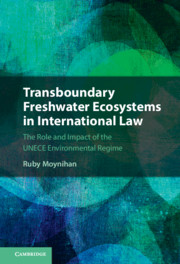 Transboundary Freshwater Ecosystems in International Law
Transboundary Freshwater Ecosystems in International Law Book contents
- Transboundary Freshwater Ecosystems in International Law
- Transboundary Freshwater Ecosystems in International Law
- Copyright page
- Dedication
- Epigraph
- Contents
- Figures
- Preface
- Acknowledgements
- Treaties and Other Instruments
- Table of Cases
- Abbreviations
- 1 The Role of International Law in Addressing the Global Freshwater Ecosystem Crisis
- 2 Conceptualising the UNECE Water and Environmental Regime
- 3 Contemporary Status of International Law on Transboundary Freshwater Ecosystems
- 4 The Common Normative Framework of the UNECE Environmental Regime and Its Contribution to International Water Law
- 5 An Ecosystem Approach in International Law Concerning Transboundary Freshwater Ecosystems
- 6 Public Participation
- 7 River Basin Organisations, Basin Agreements and European Environmental Law in the UNECE Regime
- 8 Transboundary Freshwater Ecosystems in International Law
- Bibliography
- Index
8 - Transboundary Freshwater Ecosystems in International Law
The Role, Impact and Future of the UNECE Environmental Regime
Published online by Cambridge University Press: 01 October 2021
- Transboundary Freshwater Ecosystems in International Law
- Transboundary Freshwater Ecosystems in International Law
- Copyright page
- Dedication
- Epigraph
- Contents
- Figures
- Preface
- Acknowledgements
- Treaties and Other Instruments
- Table of Cases
- Abbreviations
- 1 The Role of International Law in Addressing the Global Freshwater Ecosystem Crisis
- 2 Conceptualising the UNECE Water and Environmental Regime
- 3 Contemporary Status of International Law on Transboundary Freshwater Ecosystems
- 4 The Common Normative Framework of the UNECE Environmental Regime and Its Contribution to International Water Law
- 5 An Ecosystem Approach in International Law Concerning Transboundary Freshwater Ecosystems
- 6 Public Participation
- 7 River Basin Organisations, Basin Agreements and European Environmental Law in the UNECE Regime
- 8 Transboundary Freshwater Ecosystems in International Law
- Bibliography
- Index
Summary
This chapter concludes this book by exploring the success, limitations and future global outlook of the pan-European UNECE environmental regime including challenges for future non-UNECE accession, drawing upon an unparalleled seventy years of experience supporting international law on transboundary watercourses and freshwater ecosystems. From the key findings, this book draws a series of overarching and cross-cutting insights into the rising impact and contribution of the UNECE regime to the clarification and development of international law, which also raises outstanding areas for future research. It explores questions of legitimacy as the UNECE regime moves towards its new global role. This research bears in mind the importance of distinguishing policy arguments for signing up to the UNECE regime with legal arguments. The problem arising from a legal perspective is to ask whether it is good legally when international courts or international institutions endorse a regionally specific detailed regime as global law? This analysis demonstrates that the UNECE environmental instruments were never intended to be geographically exclusive and have also already been co-developed by non-UNECE countries for some time. This research supports the UNECE’s endeavour to embrace a global role but cautions that a strong mandate from non-UNECE countries must drive this process.
Keywords
- Type
- Chapter
- Information
- Transboundary Freshwater Ecosystems in International LawThe Role and Impact of the UNECE Environmental Regime, pp. 280 - 305Publisher: Cambridge University PressPrint publication year: 2021


